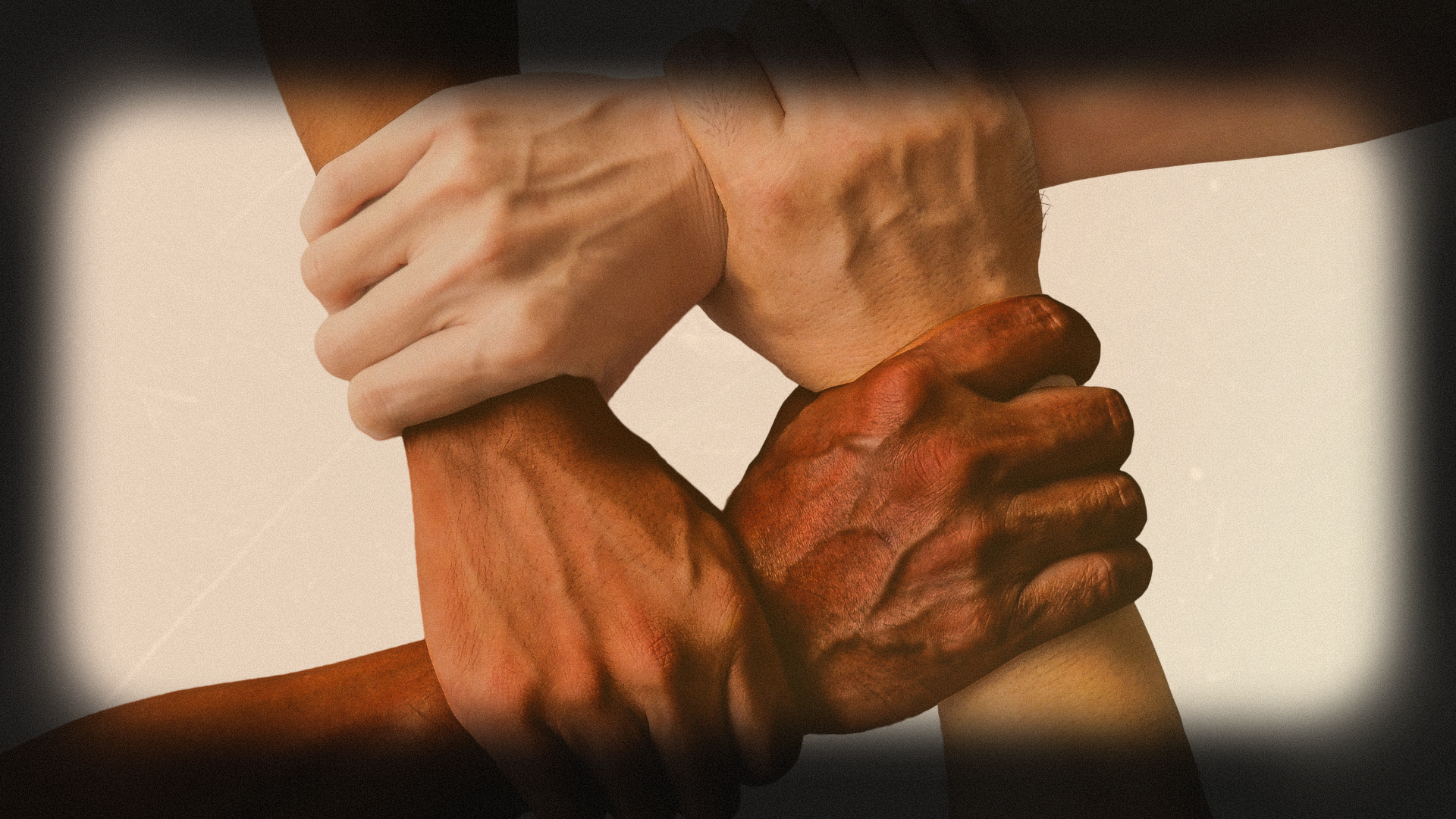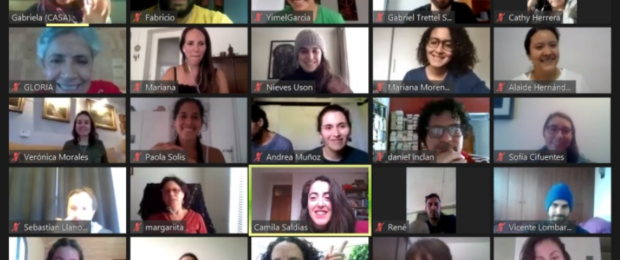My name is Ana Inés Heras. I live and work in Argentina, although at different points of my life I also lived abroad. Since 1999 I have been working in several regions of my native country as a National Researcher for the Argentinean Council – CONICET, as a university professor and an activist. The regions we work in and organizations we work with vary over time, since our work is dynamic. Groups and people who reach out to us are integrated into our work over time at different geographical locations in our country (e.g., the North West, the North East, the Southern Andean region).
Out of this work, and over the years, I supported the creation of a transdisciplinary and trans-organizational team, which works as a Co-Elaborative Research Hub, on issues related to direct democracy in different types of organizations (e.g., cooperatives, community groups, social movements). We conceptualize our work both as a collaboration and as an elaboration that takes place jointly, that is, a co-elaboration By this we mean that we not only cooperate (collaborate) with several organizations, networks and coalitions, but that in the work we do together, we specifically find a space and a time, regularly, to work on topics we want to know more about, that is, conduct research. In this manner, our collective process of knowledge generation takes the name of co-elaboration and co-elaborative work. We jointly investigate issues that are interesting for all of the participants through the Research Program Aprendizaje de y en Autogestión, roughly translatable as Learning about and with Self-Governed Organizations.
Our team, specifically, contributes to fostering access to basic rights, like education and health, in the cases I portray in this piece. I seek to make publicly known a type of work that the networks have been creating, in a far corner of the world, namely Argentina. It is indeed crucial that we narrate and communicate concrete stories, based on histories of collective struggle, that can continue to inspire our search for a better world.
In this short piece I will portray the work of our team in collaboration with two different networks in Argentina, one related to rural secondary schools in the Province of Buenos Aires, and the other one related to small workers cooperatives to support people who suffer from mental health-related challenges. I reflect on the notion of dynamic coalitions to describe what happens when such coalitions are built, and sustained over time. Even when there is conflict, tension or difficulties, a new way of understanding organizations and solidarity emerges, one which we have termed organizational solidarity in practice. As someone who describes herself as a militant-scholar, I want to highlight the importance of participating in documenting, analyzing and interpreting the ways in which several different groups are making choices to live together well.
The goal of my text is twofold: on the one hand, I seek to describe the way a team of academic-activists (like us) collaborates with grassroots organizations. On the other hand, I aim to highlight the contributions that a co-elaborative research approach may bring to our current contexts, in identifying different ways of living, doing the economy, working, and participating. This is important because we need to stay alert and keep constructing alternatives to the capitalocentric perspective that figures capitalism as the only way of doing life, as J.K. Gibson-Graham has pointed out (2006). Writing in a global context of war, actions of dispossession, exploitation and right-wing governments dominating the so-called democracies of the West, I find it not only necessary but urgent to make visible practices, discourses and meaning making processes of a different nature. For example, when participating in the creation of self-sustained, self-governed small cooperatives, and contributing to the integration of people otherwise segregated from labor, we not only concretely provide opportunities for work, but also co-create discourses and meaning-making processes that question segregation in society. It is thus by taking our daily practices seriously, and making them public, that we can actively contribute to constructing a Global Tapestry of Alternatives, in the words of the collective of activists, artists, practitioners and academics.
The two networks I am writing about have different histories. The Educational Centers (the way the rural schools are referred to) started in 1989, and over time, created a Federation in the Province of Buenos Aires, FACEPT, by the acronym in Spanish. The mental-health cooperative network started in 2017. Even though these two networks' histories differ, they share several characteristics and are very important for the people participating to advance access to their rights: right to education, to work, and to living conditions that they regard as "the way they choose to live", in terms of emancipatory and cooperative-collective practices.
As I said, in this piece I will reflect on the importance of bridging dynamic coalitions for a more comprehensive agenda, supporting the rural school federation and the mental health cooperative network over time, which become stronger through the collaboration of several different social actors. It is in these contexts that public and free universities like the one I work at, can contribute.
It is important to state first that our research group has been working together for more than two decades, and in this length of time, we have been invited to participate in, and have fostered, the creation of networks of support, with several different other groups. The groups with whom we engage share similar traits to our research group, in that direct democracy for decision-making is at play, as well as a desire to transform the conditions in which we live.
Since the themes, questions, and topics we explore in research are elaborated with the different groups, we refer to our research as co-elaborative. We do “co-investigación” where the questions we formulate and the issues we investigate come out of long-term relationships with the organizations with whom we collaborate.
Argentina is a very large country, and the public education system used to be known as one that would guarantee access to education for children and adults, since it is an open, free of charge, system. It is mandatory from preschool to the end of high school; national and provincial universities are free at the undergraduate level and are very accessible (tuition wise) at the graduate level.
However, as in all countries in Latin America, access to schooling across the country is not equal for all families; neoliberal administrations have also threatened our once well supported public educational system. Specifically, in the Province of Buenos Aires (a large territory of 307 571 km²), access to secondary education for rural families is indeed a challenge. Out of this challenge, in 1989, several families demanded to create an educational system for their children whereby they could commute and stay in school for two weeks and then go back to their homes for the two consecutive weeks, to do schoolwork at home. This system is known as “Alternation” educational system.
During their homestay, children are also visited by their teachers who follow up on their learning. Funds for these schools are provided by the province, but the families also coalesce with other local organizations to support meals and other resources when the students stay at school. The curriculum in these schools follows the Secondary School Rural curriculum, yet the families, teachers and principals, working with local communities, have made decisions as to how the curriculum is being taught. In other words, there is a possibility to accomplish learning through hands on activities, at the schools, and at the homes of the children, and the pedagogical orientation is based on Paulo Freire's pedagogical notions of popular education and education for freedom.
Our team has been cooperating with the schools since they started, first by some of us participating in the meetings that gave birth to the proposal, and later by advising on matters related to community building and communication for families and communities. During 1999, our team was also asked to provide a two-year workshop for families who were interested in learning how to co-organize their schools with teachers and other participants.
Through our co-elaborative research plan, where we contributed our research skills to address the community's questions. Some of the topics we research together relates to how different social actors interact to build the dynamic coalitions that support the schools, how decisions are made when families and school-personnel work together, and whether (and how) students participate in shaping their own educational processes.
Social Cooperatives for Community Mental Health is a good enough translation to describe the way in which workers' cooperatives are formed to support the inclusion of people diagnosed with conditions that hinder their participation in society. The approach as such (salud mental comunitaria, in Spanish) was built over time, in different parts of the world, starting after the second world war.
In Argentina, this approach and epistemological perspective is also related to the work of Social Psychologist Enrique Pichon Riviere, who transformed his initial approach to treating psychiatric patients into a clinical social psychology practice to include people. There are two main premises underlying the approach of community health: one is that it is the whole community who is benefiting from including all people in society; the other is that when people who suffer are supported to become a legitimate member of society, they can bring perspectives unknown to others, that constitute a fabric whereby new learning experiences take place.
Social cooperatives are defined as small production units (e.g., to produce food, clothing, ceramic pieces or build a vegetable garden) that provide an opportunity for both so called “patients” and “professionals” to become partners of a workers' cooperative. In this manner, when people seek medical treatment and are offered to become a partner in a small group (a social cooperative) they interact with professionals of the public mental health system, as co-workers of their cooperative. In Argentina there are 60 such organizations spread out in different provinces. For example, the Cooperative “La Cuci de Abe” is located in the city of La Plata and is part of the project supported by the community organization called “Una Movida de Locos”.
The community mental health approach moves away from medical/psychiatric models of framing mental illness as a disability in favor of a participatory, social/person-centered orientation informed by service users, their loved ones, the professionals working with them in the public health system, and university and community-based research teams such as ours. Over time, our team has worked with several different groups supporting social cooperatives for community mental health, and together we have identified themes and research questions worth pursuing. For example, we have documented how these cooperatives become an important support system for both so called “patients” and “professionals” alike, concluding that indeed a community mental health approach benefits us all, changing thus the conceptualization of support altogether. We have also analyzed how work done with our hands may put us all on the same wavelength and may also provide relief. We have also documented how these organizations are born out of coalescing, so that their status as an organization can't be described as the work done by “one group” but by a complex network of organizations, groups, and participants.
I want to end this piece by reaffirming the importance of making visible the work of dynamic coalitions, such as the networks I described here, to the public, in search of promoting a better understanding of what it means to overcome challenges by coalescing and by transforming our living conditions, day by day, bit by bit, tenaciously.
I also want to portray how a scholarly practice that is connected to community work all along may become an ally. When we work with groups for a long time, building a research agenda that is considered by all parties involved as a tool to continue working for accessing human rights for all, we may find quotidian ways to construct knowledge together. An agenda for coalescing dynamically, over time, is happening now, and it is important to acknowledge it.
This article is part of a degrowth.info series on movements for social and environmental justice worldwide. Find out more and read the other pieces of the series here.

As a response to Jason Hickel's interview with the Break-Down Journal, the authors share their thoughts on degrowth as a concept and a movement, and the role it plays in a challenging political context.

An open letter presented at the 2024 degrowth conference, which calls for addressing inequalities in the degrowth movement

What does degrowth mean in the Latin American context? In 2020, a series of six self-organized encounters attempted to dive into this question. Each meeting reflected the metaphor of the agricultural process: from sowing to harvesting. Among the conclusions was a unanimous desire to put into practice ‘other ways of inhabiting the world’, valuing the knowledge of the original peoples and inhabit...